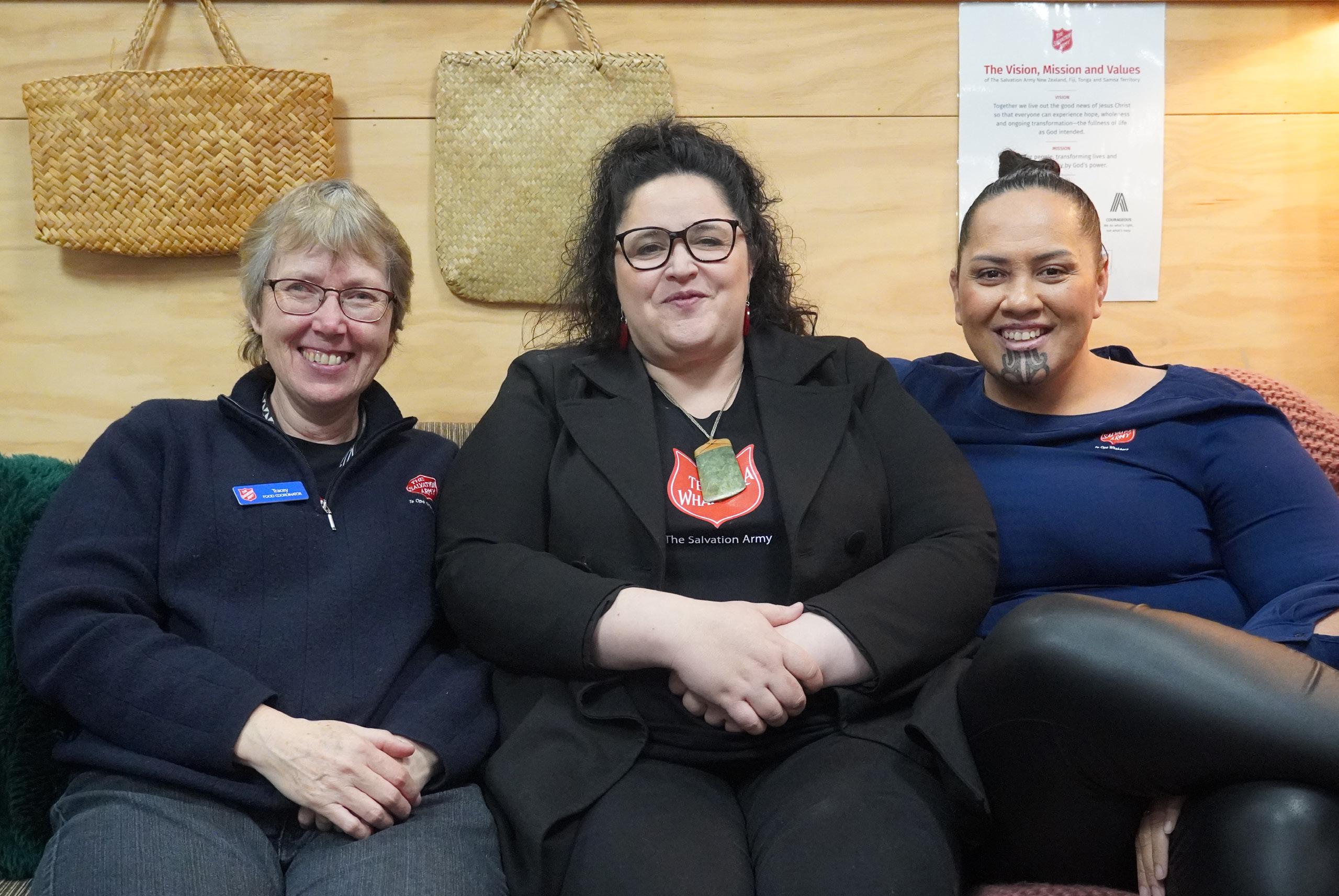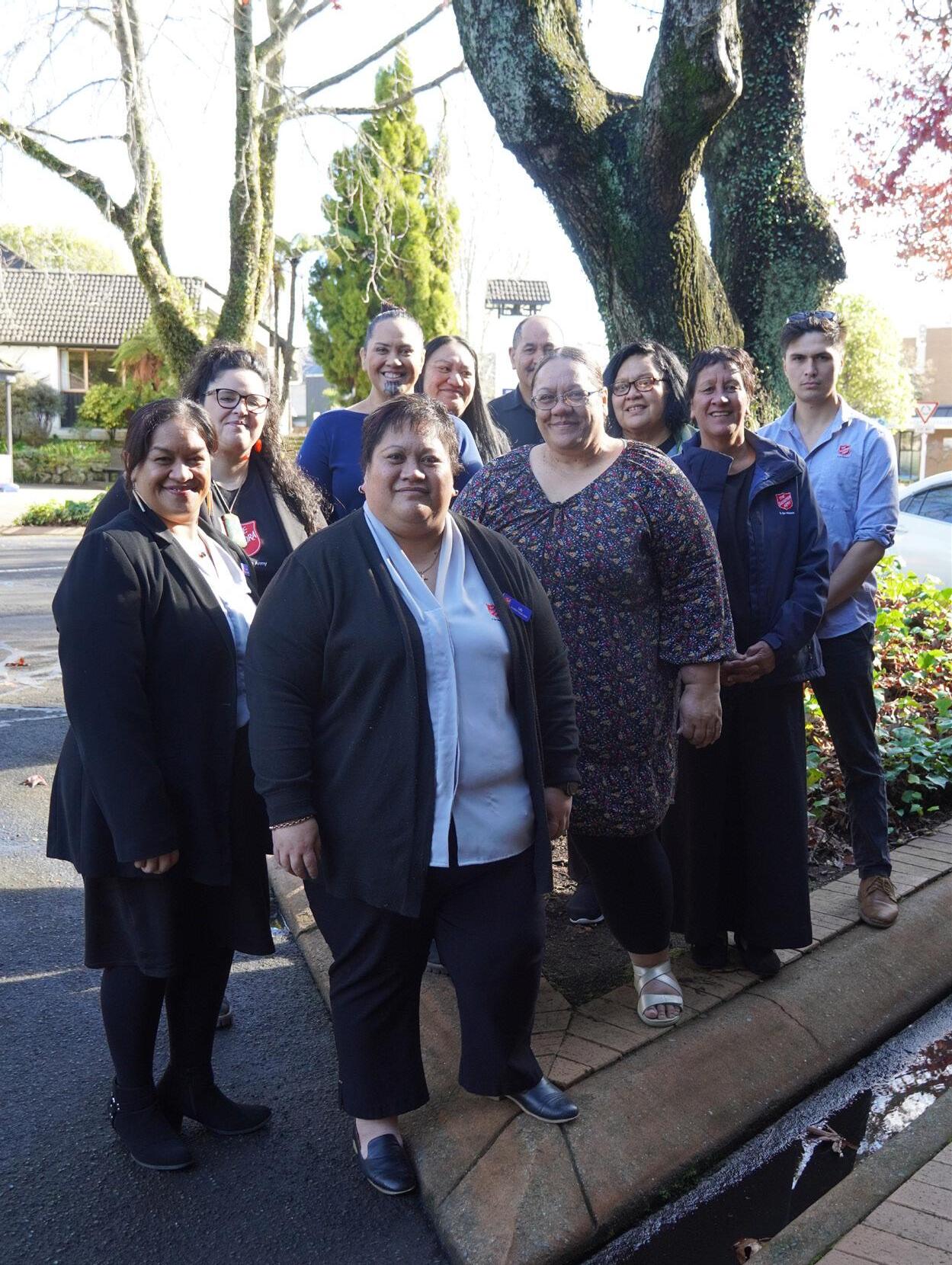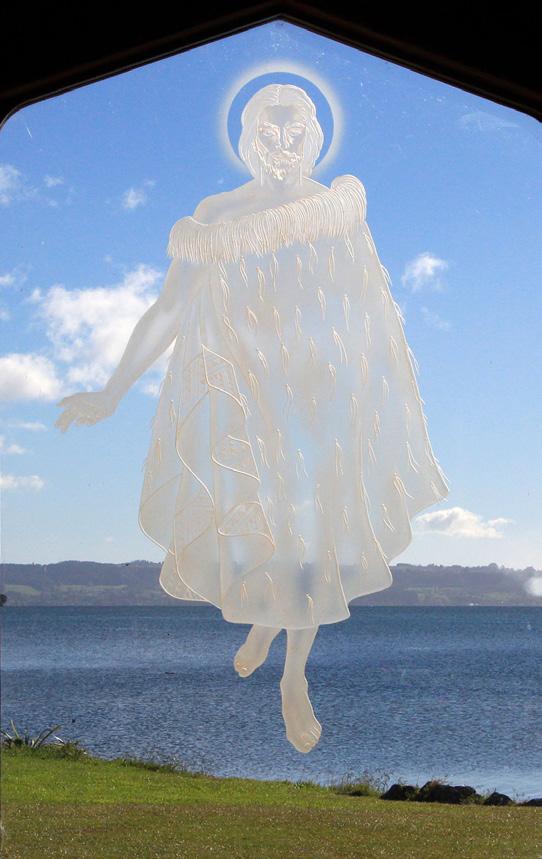
9 minute read
Tūrangawaewae The Māori Space
While Māori make up around 17 percent of Aotearoa’s population, that figure leaps up to 45 percent in Rotorua. The team at Rotorua Salvation Army are intentional, unapologetic and passionate about partnering with God to see tangata whenua (people of the land) thrive and flourish.
WORDS Jules Badger
Te Tiriti o Waitangi (The Treaty of Waitangi) promises flourishing for all people who call Aotearoa New Zealand home. However, Captain Hana Seddon (Ngāpuhi, Te Rarawa, Ngāti Pūkanga) asserts that we are not seeing flourishing for many tangata whenua. Hana, who is corps officer and director of Community Ministries at Rotorua Corps (church), says that together with her team, they are committed to changing this and leaning into the Army’s priority towards those who are struggling with injustice, poverty and addiction.
‘For too long Māori have primarily been engaged as “clients” of The Salvation Army,’ says Hana. ‘What we want to see is Māori thrive and rise and take their place in every space where we already see Pākehā in leadership and in every other level of the Army. We have yet to discover the true riches that Māori culture can bring to our Salvation Army mahi (work) and faith communities.’
Nourishing and flourishing
When Captains Kylie and Ralph Overbye (Hana’s predecessors) arrived in Rotorua in 2016, Salvation Army services were dispersed across the city, with the corps, Community Ministries and Family Store each operating from different locations. In 2019, the Overbyes worked hard to relocate all expressions of the Army into one centre, right in the heart of Rotorua City.
‘Kylie and Ralph paved the way for what God is doing now,’ says a grateful Hana. ‘They also urged Salvation Army leadership to ensure that someone Māori follow them because of the make-up of the community. Having one physical space makes it so much easier to connect our mission and ministry.’
Community Ministries Manager Darnielle Hoods (Ngāti Whakaue, Ngāti Kahungunu) explains that the new site has a very special history for Māori.
‘We are situated now on what was once a kūmara garden for the whole iwi in the area. So when we consider the soil beneath our feet once produced sweet kūmara to nourish the people, it begs the question, what are we producing? What is coming out of the soil of our ministry here? Are we producing sustenance for the people? Is this a place of thriving and flourishing for Māori? It’s important to understand what came before—the origins and history of a place. It adds richness.’
When Hana arrived in January 2022, fallout from the pandemic loomed large across the city. News stories reported homeless whānau (families) being housed in motels and hotels usually reserved for tourists to the region.
‘It was hugely controversial, so part of our response was to develop our Transitional Housing services and expand the way we support whānau,’ explains Hana. ‘Now we have services in both Rotorua and Tokoroa, and a growing team of social workers, navigators (advocates) and property coordinators.’
Darnielle is careful to explain that building the Transitional Housing team has taken time and a lot of prayerful consideration. ‘We need the right skills but, more importantly, we’re always asking God to bring to us the right people because we also want our team to flourish. When we are flourishing, we are in the best position to serve whānau.’
Darnielle adds, ‘I love the values of The Salvation Army, and they are interwoven within our team culture. We talk about them every day. How can you be innovative in your role today? How can we respond to the housing crisis here in Rotorua with the resources we have? The big one for the Transitional Housing team is how will we be courageous and do what’s right and not what’s easy? Saying yes is sometimes a hard option, because it means we are committing to figuring out how we can help when it seems so impossible. But this is so much more than just a job—it’s about intentionally wanting to see lives transformed!’
Outward facing and community focused
An important strategy for the team at Rotorua is having a strong ministry to the community and a team deeply connected within it.
‘This priority takes us back to the origins of the Army,’ explains Hana. ‘Ensuring we are aligned with what the movement has always been about is important to us. Everything that comes under Rotorua Salvation Army is outward facing and community focused. The real, raw and gritty issues that our community are dealing with are what our team face and so we need a unified team culture right across the board that is healthy, because this is hard mahi.’

With 74 percent of the whānau presenting for help being Māori, the team have worked hard to increase cultural connection.
‘People need to see someone who looks like them,’ says Darnielle. ‘Having Māori on staff immediately brings down walls.’
Currently, 80 percent of the staff are Māori, but it’s not just about culture—faith is foundational. Every day begins with devotions, including karakia (prayer), waiata (songs) and a focus on the Army’s values. The staff are 70 percent Christian and represent six different local churches.
‘As part of our onboarding process we always explain clearly that you don’t have to be a Christian to work with us, but you do have to be prepared for an unashamedly Christian working environment,’ laughs Darnielle. Hana adds, ‘We always ask prospective employees how they will deal with all the hallelujah people!’
Hana’s vision for the Army in Rotorua is clear: ‘I see us as one Army. I don’t distinguish between Sunday and Monday. That’s a challenge for some who might see Sunday as spiritual and Monday as practical, but a biblical response to need happens all week. Our staff pray with people just as we pray together on Sunday. Whether it’s Transitional Housing, our Family Store, the church or Community Ministries we are one people, one Salvation Army moving towards greater and greater unity. We all have different roles but our collective commitment to the kaupapa (principles) are the same. You should be able to walk into The Salvation Army Rotorua on a Sunday or a Tuesday and be treated with the same manaakitanga (hospitality), aroha (love) and sense of openness, regardless of what day of the week it is.’
Spearhead of change
Kai (food) coordinator Tracey Ball is a Pākeha woman who loves her job and the team she’s part of. When Tracey’s pastor shared two years ago that the Army had some job openings, she sensed a nudge from the Holy Spirit. Hana and Tracey soon met for coffee and korero (talk), and Tracey began working as a volunteer, quickly filling a gap in business administration before settling into her current role and eventually joining the church.
‘The Salvation Army needs to be the spearhead of change, and not the rod of resistance when it comes to making space for Māori,’ says Tracey. ‘It’s easy to stick with the status quo and the comfort of what we’ve always known, but change is about new life. You can’t put “new wine into old wineskins”. So I pray for the courage to change because we must change, but we must do that with love and encouragement and give grace to one another because change is hard. But unless you are willing to acknowledge what you don’t know, then you can’t learn anything new. I’ve been invited on the journey and have chosen to embrace learning about Māori culture. It’s not about losing your identity as Pākehā but enriching it.’ Hana is under no illusion when it comes to the challenge around change.
‘Change is exciting and inspiring, but at the same time it can be incredibly painful and costly. I talk about “mokopuna (grandchildren) decisions”, and by that, I mean creating space today where our children, grandchildren and great-grandchildren will feel welcome and at home. For many of us, that means sacrificing what we are most comfortable with for the sake of someone’s new faith journey. When 45 percent of the population are Māori but only 5 percent of our Sunday congregation are Māori there must be an intentionality about changing that. I acknowledge how hard that is because when you make room for something, you have to lay something else aside or find another way for that to happen.’
Ever the pragmatist, Hana has a vision to move away from a one-size-fits-all approach to broader micro-communities all under the umbrella of Rotorua Salvation Army.
‘We want to create opportunities for people to gather around what is familiar and inspiring and helpful. For some that will be a more traditional Army service, for others that will be a Recovery Church-type space. We’d also like a new gathering that offers waiata and karakia and teaching te reo. We are also considering a “messy-church” mid-week family gathering.’
Drawing on the prophetic words of Catherine Booth, co-founder of The Salvation Army, Hana leaves us all with an important challenge.
‘If we really care about the things we say we care about then we can’t just talk, we must act. If that action disrupts things, then I would point back to our cofounder. She said: “If we are to better the future, we must disturb the present”. The question is do we really want to see a better future for Māori? Are we truly committed to that end? Or are we more committed to our present and familiar comfort? If we want a better future for all, then we cannot disconnect that from a need for disruption in the present. Those two ideas are deeply connected, and here in Rotorua we know that God is in this.’
The Whenua (Land)
Ōhinemutu (on the shores of Lake Rotorua) is a significant place for both Māori and The Salvation Army. Once a Ngāti Whakaue village before the government laid out plans for the city, the whenua remains an important site for the iwi. The meeting house is named Tamatekapua, after the captain of the Arawa canoe who brought the first ancestors from Polynesia, and the Kotahitanga (Māori parliament) met at Ōhinemutu in 1895. The first Salvation Army officers in the area were young women who held gatherings at Ōhinemutu, with Captain Sarah (Hera) Stirling well known for her ‘golden voice’, and a barracks being built in 1897. Today St Faith’s Anglican church sits opposite the meeting house, with its famous window depicting Christ wearing a korowai (Māori cloak) and appearing to walk on the waters beyond.











